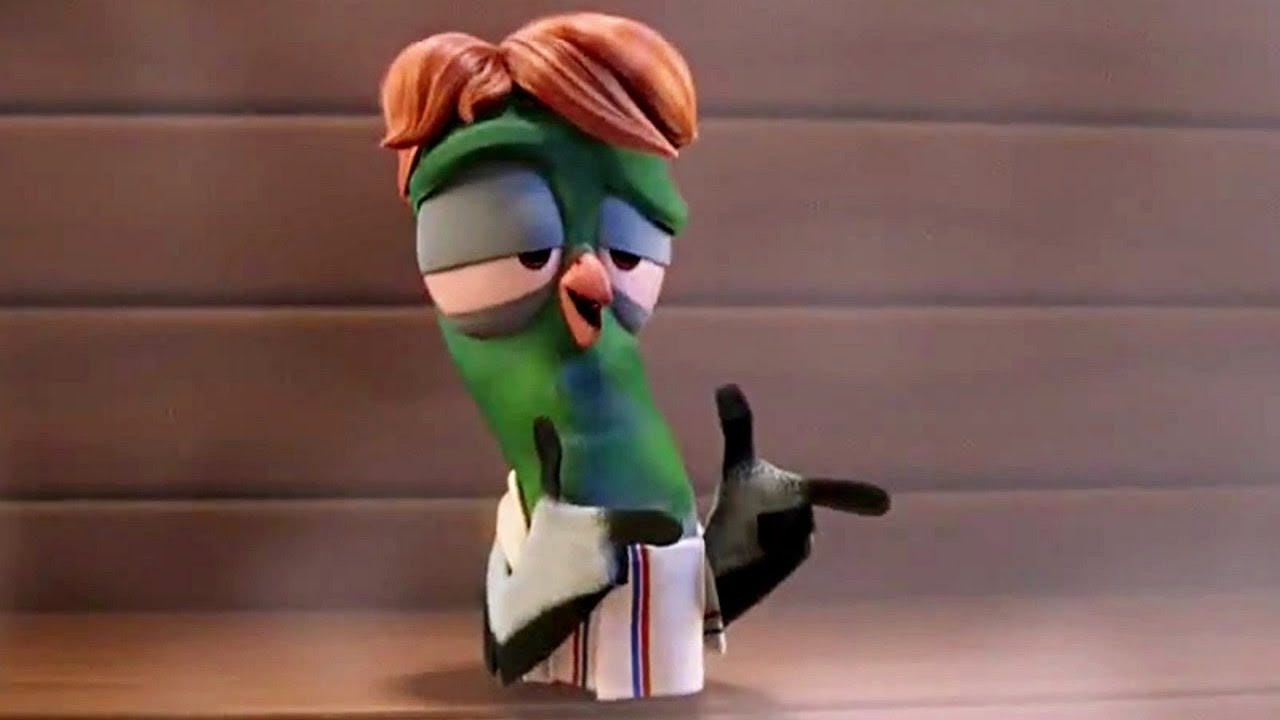"What's funny about that?": did humans develop a sense of humour to survive?
Featuring Pigeon Toady!
Psychological and social complexity
Humour is one of the most curious aspects of being human - a quirky mix of logic, emotion, and social interaction that makes us laugh, bond, and occasionally wonder what on earth is going on. But why do we find the absurd so amusing? Why do characters like Pigeon Toady, from the 2016 animated movie Storks, make us laugh instead of cringe, even when they display traits that, in real life, we would find offputting?
In the world of Storks, the storks have given up delivering babies, and have formed a large company employing all kinds of birds, delivering consumer goods, a riff on MegaGiantCorp, Amazon. Pigeon Toady is a bumbling employee within this corporate world, whose misguided attempts to be cool and relevant often lead to chaos, making him a source of absurd humour and comic relief. Pigeon Toady is the oddball of the bunch, desperate to make friends and be liked, but with a major knack for missing the mark. He’s that guy trying too hard to be “cool,” fumbling with awkward slang and bizarre off-target self-confidence, and ending up somewhere between endearingly clueless and outright ridiculous. By all accounts, he should be annoying—but somehow, you can’t help but be charmed by his sheer audacity, ending up completely stealing the show.
What makes Pigeon Toady so oddly likeable is the vulnerability behind all that bluster. His constant failures and social missteps hint at something familiar: that desperate desire to fit in, even if you’re doing it all wrong. He’s the ultimate comedic underdog, stumbling through with a pigeon’s peculiar kind of swagger, and it’s hard not to feel a bit of sympathy. After all, who hasn’t felt like the odd one out?
There’s also a touch of something else with Pigeon Toady that might explain why we’re willing to let him off the hook. He shows signs of what you might see in mild autism; social awkwardness, a literal way of speaking, and a tendency to follow his own odd logic no matter what’s happening around him.
In fact, Pigeon Toady is more than just a punchline. He reflects our own little social hiccups and that universal dance of trying to fit in, even if it’s with all the grace of a pigeon strutting about. We laugh because, deep down, we recognise a bit of ourselves in his antics.
The Science of Humour
Pigeon Toady was one of the more successful comedic characters in recent pop culture because he is actually a deeply complex and relatable psychological reflection of ourselves in our own time and place.
The classic Wiley Coyote catapult sequence; one of the greatest “silent” visual comedy sequences ever created.
Laughing at a character like Pigeon Toady, some variation of which we all know in real life, comes from a mix of psychological responses involving cognition, social and emotional reactions that create a kind of mirror of self-recognition:
Release of Social Tension: Laughing at Pigeon Toady’s blunders and social missteps provide a safe way to release social tension. We laugh at his awkwardness because it mirrors situations we’d find uncomfortable in real life, but without real consequences to ourselves.
Superiority and Incongruity: Humour theories say we feel a sense of superiority over Pigeon Toady’s obvious flaws and laugh at the absurd mismatch between his expectations and reality, which we see but he doesn’t.
Relatable Vulnerability: Beneath his antics, Pigeon Toady shows a vulnerability that’s relatable. His misguided attempts to fit in resonate with the universal human experience of wanting acceptance, making us laugh with a mix of empathy and recognition.
Benign Violation: He violates social norms in a way that’s harmless and contained within the comedic world of the film.
Cognitive play: the brain’s love for exploration and mental gymnastics. Pigeon Toady’s unpredictable nature keeps us engaged in a kind of playful problem-solving, piecing together his bizarre actions and seeing where his offbeat logic might lead. This taps into areas of the brain associated with creativity and flexible thinking, making his character not just funny but mentally engaging.
Laughing and survival; evolutionary psychology
From an evolutionary angle, psychologists think humour might have evolved as more than just a good time; it’s actually a pretty big survival tool. Humour can break the ice, smooth over social tensions, and help groups bond, all of which would have been crucial for early humans trying to survive and thrive together in unforgiving conditions.
Evolutionary psychologists also argue that humour is like a neon sign for intelligence and creativity, traits that make someone have a higher chance of finding a partner. Humour acts like a social superpower, making individuals more attractive as potential mates because it signals they have the mental agility and resilience that are valuable in a partner.
It helps in forging and maintaining alliances outside marriage as well. Sharing a laugh creates a sense of camaraderie - or in-group recognition - and trust, making it easier to build and strengthen social bonds. This was particularly important in our evolutionary past, where belonging to a group increased one’s chances of survival. Laughter can diffuse tension, resolve conflicts, and even establish dominance in a non-threatening way, helping to maintain harmony within a group.
Humour and health
Cognitively, humour encourages creative thinking and problem-solving by promoting mental flexibility and allowing us to approach challenges from fresh perspectives. It’s not just about the punchline; it’s about training the brain to navigate complex situations with a lighter touch.
From a health standpoint, humour acts as a natural stress reliever. Laughter triggers the release of endorphins, which can elevate mood and even help alleviate pain. It reduces cortisol levels - the so-called “stress hormone” - helping to mitigate the effects of stress on the body, and can enhance immune function. Regular laughter has even been linked to better cardiovascular health, improving blood flow and supporting heart health.
Socially, humour is a powerful bonding tool. It’s a subtle yet effective way to enhance relationships and foster a supportive social environment. In essence, humour serves as a sophisticated cognitive tool for maintaining mental sharpness, physical health, and social harmony.






